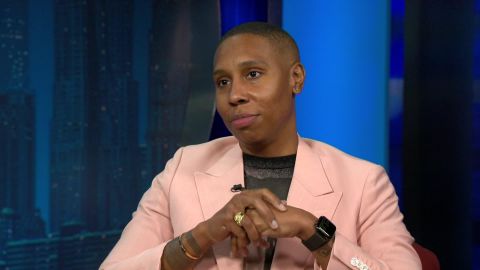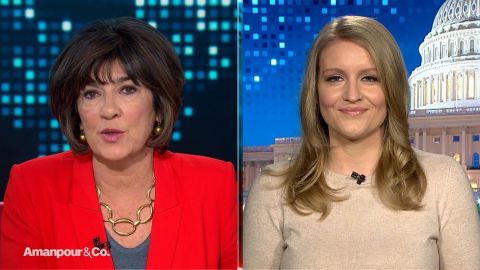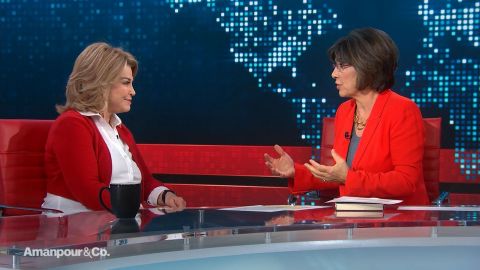Read Transcript EXPAND
CHRISTIANE AMANPOUR: Lena Waithe is an Emmy Award-winning screenwriter. Her first feature film, “Queen & Slim,” follows a black couple after an awkward first date ends in unexpected bloodshed. On the way home following a routine traffic stop, the situation escalates, and a white police officer ends up dead. With the couple on the run from the law, the story explores themes of trauma, freedom, legacy, and hope.
Our Alison Stewart sat down with Lena Waithe to talk about it.
(BEGIN VIDEOTAPE)
ALISON STEWART: Lena, welcome.
LENA WAITHE: Thank you for having me.
STEWART: So, this film, what was it about putting this couple on a first date? What was it about that being a first date allowed you to develop the characters?
WAITHE: Well, that was sort of the initial idea. That wasn’t me. James Frey was like a man and woman — black man, black woman on a first date. They’re on the way home, and they get pulled over by a police officer. So that part was sort of already baked in. And it just sort of, I think, adds to the cinematic elements of it, because it just makes it a more interesting thing. If you’re pitching story, yes, it would be cool if they were a couple, but then we’re sort of having to catch up to them in terms of their language, in terms of their history. Them being — them not knowing each other allows the audience to get to know them as they get to know each other. So it just makes for a much more interesting experience.
STEWART: And the date didn’t go well, which is really interesting…
(CROSSTALK)
WAITHE: It doesn’t go bad, doesn’t go great.
STEWART: Yes, well enough.
WAITHE: It’s sort of in the middle.
STEWART: Yes, well enough.
WAITHE: And that was the thing that James also said too. He was like, it’s not great, it’s not horrible, somewhere in the middle, which I thought was also interesting, so you wouldn’t know, like, would they have seen each other again? Is this getting better, things — as they start to warm up to each other in the car, white supremacy hits.
STEWART: So it’s a routine police stop. I have been in a car when a white guy is driving and been stopped by the cops. I have been in a car when a black man has been driving and stopped by the cops.
WAITHE: Right.
STEWART: Two very different experiences.
WAITHE: Very different, yes.
STEWART: We all know the experiences, sadly, from the news, Philando Castile, Walter Scott. Did you draw from any personal experiences when you were writing that scene?
WAITHE: I haven’t had a violent experience with the police, but I have been pulled over before. But I don’t drink. I have never had a speeding ticket. So I shouldn’t be nervous when I get pulled over by a police officer. But there’s just an innate fear that happens if you’re a person of color that gets pulled over by the police. I think not just black people, I think if you’re Latino, I think if you’re maybe Native American, any person that is not white, I think you kind of have a little bit more nerves when get pulled over, because you don’t know how it could end. It could be life or death.
STEWART: In writing the character of the police officer, who is played by Sturgill Simpson, who is a great musician, great country singer.
WAITHE: Yes. Yes.
STEWART: He is so clearly evil. He’s abominable. Was…
WAITHE: I don’t know that’s true.
STEWART: Oh, you don’t think so?
WAITHE: No. No. I think that it’s important that, when he gets in the car — and this is on the page — that you see a picture of his family on the dashboard when he gets in his cop car. He has a wife waiting for him. He has two kids waiting for him when he gets home. He’s not a monster. He’s a person that’s doing his job. He’s a person that may have preconceived notions about people of color, possibly. And there’s also a point in which he may feel disrespected. But there’s a — but Daniel and I had a conversation recently where he said, sometimes, a black person respecting himself can come off as disrespect to a white person unintentionally, even if it doesn’t mean to be. So what I found was that it’s not about hero or villain. It’s a moment. It’s a moment of, oh, so you don’t respect my authority? So you don’t acknowledge that I’m a police officer? So you don’t acknowledge that you’re a civilian? You don’t have the power in this scenario. I’m armed. You are not.
He’s also technically outnumbered, even though it’s two against — neither one of these people have a gun. He technically feels like he is in danger. When she gets out of the car, she says, I’m reaching for cell phone. He doesn’t — he can either trust that. What if it’s a lie? What if she’s not reaching for a cell phone?
(CROSSTALK)
STEWART: He has a position of power, though.
WAITHE: Correct.
STEWART: He has the position of power.
WAITHE: Correct.
STEWART: My point is why I thought…
(CROSSTALK)
WAITHE: He says, get back in the car. She doesn’t. You know what I’m saying? It’s like — so, to me, that scene — and I wrote a bunch of times — was to make sure that the audience could say, well, huh, OK, I get that. Wait. I don’t — I kind of see why he does that. I kind of see why she wants to record it. It’s all those things. Like — and it’s all happening very fast. That’s the other thing too. Things happen so quickly. You’re just sort of going off of instinct. So there are no heroes and villains in the movie, I feel.
STEWART: You know what? Let’s take a look at the clip.
WAITHE: Let’s do it, yes.
(BEGIN VIDEO CLIP, “QUEEN & SLIM”)
DANIEL KALUUYA, ACTOR: Could you please hurry up?
STURGILL SIMPSON, ACTOR: What did you say?
KALUUYA: It’s just cold.
SIMPSON: Put your hands on your head and get on the ground now.
KALUUYA: Are you serious?
SIMPSON: Get on the ground! Get on the ground!
JODIE TURNER-SMITH, ACTRESS: Why is he under arrest?
SIMPSON: Get back in the car, or you’re going to jail too!
TURNER-SMITH: I am an attorney. And I demand to know why this man is under arrest.
KALUUYA: Sir, sir, sir, we don’t have to do this.
TURNER-SMITH: Why is he under arrest? What is your name?
SIMPSON: Get back in the car!
TURNER-SMITH: What is your badge number?
SIMPSON: I’m not going to tell you again. Get back in the car!
KALUUYA: Get back in the car. Get back in the car. We got this.
(CROSSTALK)
TURNER-SMITH: What is your badge number?
KALUUYA: Sir, sir, it was a turn signal. I ain’t done nothing wrong.
(CROSSTALK)
(SHOUTING)
SIMPSON: Get your hands where I can see them!
TURNER-SMITH: I’m reaching for my cell phone.
(END VIDEO CLIP)
STEWART: I’m still going with he’s a bad guy.
(LAUGHTER)
STEWART: They go on the run, because they have lost faith in the system.
WAITHE: Right. Well, she really has.
STEWART: She truly has lost faith in the system.
WAITHE: Right. Right. Right.
STEWART: And she’s trying to explain to him, you need to listen to me. I live and work in this system. I know what this can be.
WAITHE: Right.
STEWART: What did you want to explore about when we lose faith in systems, given our culture now?
WAITHE: Right, right. Well, I think the system rarely works for those who are othered. The system isn’t necessarily built to keep the playing field leveled. It’s to serve those who are often in power, often in the majority. And the system doesn’t have the best track record with people of color, particularly black people in this country. So it’s hard to trust it. It is hard to know that will get our proper day in court, we will get a fair trial, we will have a jury of our peers. It just — it can be very tricky for us.
And her being a lawyer who literally has made a living out of getting people of — probably most people of color out of jail, off of death row, she sees the system every day and watches it not really work in our favor very often.
STEWART: There’s a lot of history in this, I think. I can tell that you spent time thinking about history of police work, history of this country. Here’s there’s an Underground Railroad vibe about — as they flee, as they go from…
WAITHE: Sure. It’s the reverse slave runaway narrative. It’s the reverse.
STEWART: Yes.
WAITHE: They go from the North to the South.
STEWART: Right, from Ohio. I was going to ask, is that why you put it in Ohio?
WAITHE: Well, I put it in Ohio because the death penalty is still legal there. It was also one of the last stops before getting to Canada on the Underground Railroad. So there were a couple reasons why we did that. And also there was sort of the level of Americana that was there, sort of like middle-class working folks just trying to live a very simple life. And that’s also what Slim was in my mind. And Melina was like, OK, not only did you put it there on the page, I want to shoot it there. So we did. We went to Cleveland, and it was really cold. And we were out there in the elements. But, yes, that was a couple of reasons why I placed it there from the start.
STEWART: I have seen other interviews. You liken the two characters Queen and Slim to Malcolm and Martin and that they shift, they evolve.
WAITHE: They kind of, yes, swap places a little bit.
STEWART: Were you thinking of those two leaders when you were writing this?
WAITHE: Absolutely, just because of what they mean to us as a community, but also how they both wanted the same thing, but had different ways on how to get there, both valid and both extremely intelligent men, both very spiritual in different ways, but both valid, both equally important. And I sort of wanted to also speak to the fact that we choose what kind of black person we want to be every day, right? What do you want to be? Do you want to show up as MLK today? Do you want to show up as Malcolm X? And, sometimes, it changes depending on the day. When you get pulled over, are you , yes, sir, no, sir? All those things, like, we have to make those decisions. We don’t get to just be ourselves. We have to make conscious decisions about how we want to show up every day. And that was really what I wanted to show, is that Queen is very logical. She is not a believer. She believes that, in order to matter, you have to bend the world, you have to be excellent. And, again, that’s very valid, her ideology. But I believe Slim’s ideology is just as valid, to just exist in the world, to have love, to have children, to grow old, to make an honest living. I think we sometimes devalue that way of life. And I think I wanted to honor it a little bit.
STEWART: And as they are trying to figure out where they’re going to be and how they’re going to — how they’re going to get there, they are consistently welcomed by various communities. And they almost seem surprised, which I found interesting.
WAITHE: Right.
STEWART: Why did you want to have them be so surprised that they would go into a bar and the bartender be, I got you, like, I’m not going to turn you in, you guys are safe here?
WAITHE: Yes, I mean, I think because sometimes we as black people forget how connected we are to each other. And we sometimes don’t always believe in our community. We sometimes think — we only think as individuals at times, but the truth is, we’re part of this great big family. None of us really know who’s related to who or what, because the records aren’t always well-kept. And people — families were separated and sold. And so we have no idea who our cousins are. We have no idea who we’re connected to. We have no idea which one of our ancestors may have fallen in love with another one’s ancestors. You just don’t know. So the way I look at it is, like, whether we like it or not, we’re all connected, we’re all family in a way. But it also speaks to the fact that our — the relationship between black people specifically and the police has been extremely turbulent and fraught with anger and violence and injustice. But, also, if you go back to the days of the civil rights movement, you see young college kids participating in sit-ins or protesting. Who’s hosing them down? Who’s siccing dogs on them? Who’s beating them with batons? Not necessarily just civilians, but it’s police officers. So when you’re a young black kid in school, and you learn about the civil rights movement, you see that footage, but then the next day they bring a police officer and say, this is your friend. If you ever need help, you call a police officer. So it’s almost like a very odd thing to digest.
STEWART: Disconnect.
WAITHE: Yes, even as an adult.
STEWART: Yes. Yes.
WAITHE: You’re like, huh. So, it’s so interesting about what police represent to black people. So that’s why I knew the story needed to be told, because I said, if there was a story about two black people killing a police officer, in self-defense or not, I knew that black people would really have an opinion about those people. Some people would think of them as heroes. Some people would think they were crazy. Some people would think they were vigilantes. Some people would think they’d be doing more harm than good. I knew that there would be a difference of opinion. But I wanted to show that. I wanted to show how they walked around, and how some black folks embrace them, how some black folks do not. But I did want to show that sense of community as well, because it exists.
STEWART: And there’s a nuance to the police force as well in the film, which is really important to point out.
(CROSSTALK)
WAITHE: Absolutely, yes. For sure. And I think it could be easily dismissed as, oh, it’s an anti-cop movie. It’s like, no, every single character is human.
STEWART: When you were thinking about casting, Jodie Turner-Smith is fairly unknown to everybody in the States.
WAITHE: Yes.
STEWART: Was that intentional to make sure you had an unknown in that role, and why?
WAITHE: Absolutely. Well, because Daniel sort of cast himself in the movie, thankfully. No, he read a very early draft of it. He read it before I was able to get it to Melina, just because of the timing. He and I had dinner. He asked what I was working on. I told him the log line. He was like, I want to read that. And he wasn’t angling. He wasn’t like, oh, I’m looking for my next part. It was just, I just want to read what you’re writing. So I was like, cool. So he read it. And like, two days later, I got an e-mail that said, “I am Slim.” And I was like, oh, man, that’s really flattering. And that’s awesome. Hold on, because I got to get Melina to read it first. And as she did. And he waited while we waited for her to read it. But she end up calling me and saying: “I want to direct this. This is my first feature.” And I was like: “Amazing. Daniel Kaluuya wants to be Slim, by the way.” She was like: “I don’t see him as Slim. I don’t think of him.” I said: “Funny. I didn’t think of him either.”
STEWART: Because you had “Get Out” in your mind or “Black Panther”?
(CROSSTALK)
WAITHE: I don’t know. She had “Get Out” in her mind, for sure. I didn’t mind that. I think actors can do a bunch of things. For her, it was really ingrained into her brain. And she was just like, “I don’t think that that guy is Slim.” I said: “Get it. Just sit with him.” And she did. She said, “I will give him five minutes.” So she went, sat with him. That turned into five hours. She called me and said, “I hope you still like him because I want to offer him the part.” It was like, great. So then we had our Slim. And because he is so known, Melina and I were like, we have to break an actress. We — that was one of our demands on our list, not just final cut, but we want to break an actress and she has to be brown-skinned. And Donna Langley and everybody at Universal didn’t even blink an eye. They were like, OK, cool. And so the hunt began. And Carmen Cuba, our phenomenal casting director, she was in the first batch of women that came to us. And me and Melina were like, are we crazy to feel as if we have already found our girl? Carmen was like, no. She’s like, usually, the best are in the first batch. She’s like, it doesn’t get better as you go. We’re like, OK. So she came in and she read with Daniel. And it was magic instantly.
(BEGIN VIDEO CLIP, “QUEEN & SLIM”)
TURNER-SMITH: Where are you going?
KALUUYA: I’m going to find somebody with a phone, so I can call my family.
TURNER-SMITH: If you do that, then they will know where we are.
KALUUYA: Great~!
TURNER-SMITH: What if they kill us?
KALUUYA: Don’t say that!
TURNER-SMITH: There’s no guarantee they won’t. You’re a black man that killed a cop and then took his gun.
KALUUYA: I’m not a criminal.
TURNER-SMITH: You are now.
(END VIDEO CLIP)
STEWART: Was there something in this process that, when you made this film and you were talking to the team, that you said, you know what, this has to happen for this film to get made? And what was something that was a hard no, like, this can’t happen?
WAITHE: I didn’t want to take notes from white people. And they all agreed to that. They were like, understood, that we don’t want to do that. We have to had complete autonomy. We had to have final cut on the page. And Melina had to have final cut on what was on the screen.
STEWART: What was it — what were you — what was the issue with notes from white people?
WAITHE: Because it’s not — this is our story. It’s our story. And it’s told through my lens and my voice and my pen. And we deserve that. “Casablanca,” “Gone With the Wind,” and “Wizard of Oz,” and — there have been movies done in the king’s English for decades. We have a broken English too. We have a language as well, and I think it’s time for folks to come hear — hear our voice and see the world through our lens purely.
STEWART: When did you make the movie? What year?
WAITHE: This year.
STEWART: So, this year.
WAITHE: That was the other part of it. I said, we have to shoot it and release it in the same year, because I knew that this was urgent. I said, this won’t sit.
STEWART: I was going to ask, because the way things move now, the way things move in the culture…
WAITHE: Oh, yes. Yes.
STEWART: … the movie that you wanted to make, if you took over a period time, could be a different movie by that time.
WAITHE: Absolutely. I was like, we have to drop it, because, otherwise, it’ll just be too late. I was like, we have to get it out there ASAP. And people are ready for it. They’re ready for it. And I had no idea that so many more tragedies would have happened since I finished working on the script, since we finished filming it. I always say it’s publicity we don’t want, because our whole mission is to show people how human we are, so that maybe they will stop killing us.
STEWART: The idea that white supremacy has become — for some people, I think they thought, it’s all gone away.
WAITHE: Right.
STEWART: Like, the idea that it is so bold and bald-faced now…
WAITHE: Now. Yes, there’s no hiding.
STEWART: There’s some value in that, because it lets people know that this never really went away.
WAITHE: Right. Right. Right.
STEWART: Right? Do you know what I mean?
WAITHE: No, absolutely. I think that — I think this presidency reminded us of the country that we live in. And I think it was so shocking to some — even some white liberals. We were like, what? What’s going on? And it’s almost like, black people — there’s that funny “SNL” skit. The black people like are surprised at the returns.
STEWART: Right. Yes.
WAITHE: They’re like, yes, this is America. That’s why I love Donald Glover’s song. Like, this is America. Like, this is — it’s, like, lynchings, like, racism, Jim Crow. What’s more American than that? And I think that people are definitely letting their true colors be seen now. But, again, it’s just a reminder. It’s a reminder that this is a wound that hasn’t healed, and we keep ignoring it.
STEWART: Lena Waithe, it’s nice to meet you.
WAITHE: Thank you. So good to meet you
About This Episode EXPAND
Trump 2020 Campaign Senior Legal Adviser Jenna Ellis joins Christiane Amanpour to give the case against impeachment, then former acting U.S. Solicitor General Neal Katyal gives the case for it. Plus, Pat Mitchell discusses the need for dangerous women in dangerous times, and Lena Waithe sits down with Alison Stewart to explain her writing process for “Queen & Slim.”
LEARN MORE



